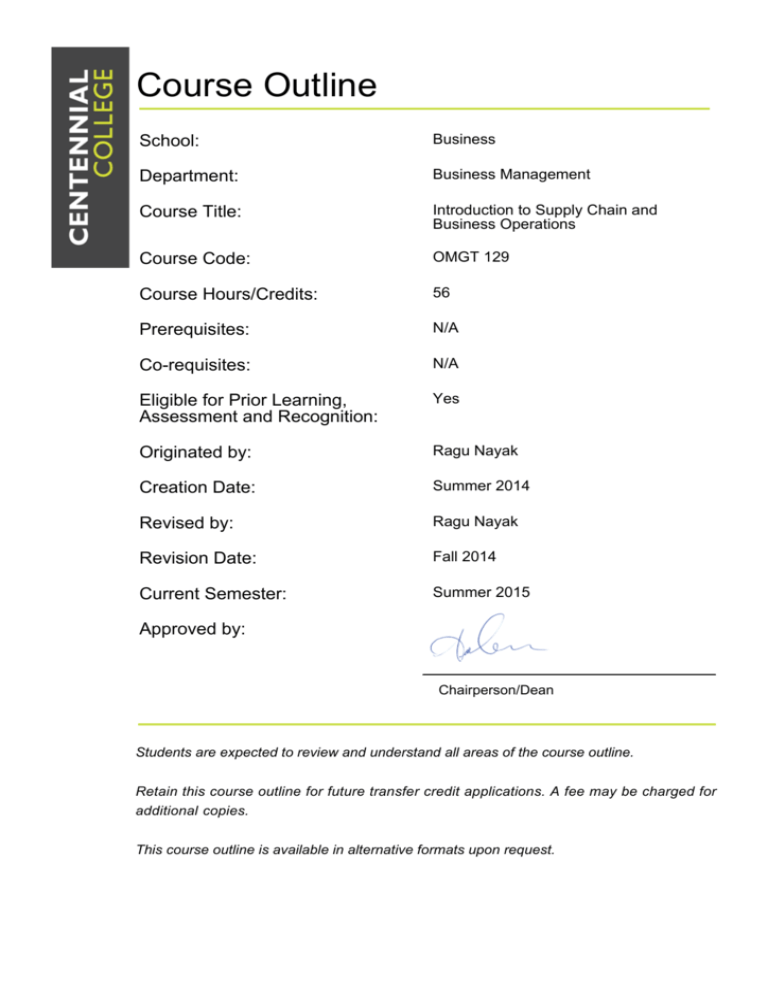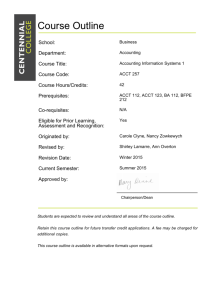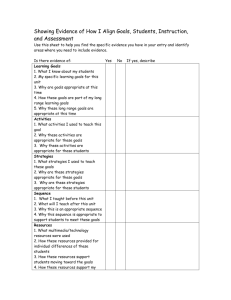Course Outline - Centennial College
advertisement

Course Outline School: Business Department: Business Management Course Title: Introduction to Supply Chain and Business Operations Course Code: OMGT 129 Course Hours/Credits: 56 Prerequisites: N/A Co-requisites: N/A Eligible for Prior Learning, Assessment and Recognition: Yes Originated by: Ragu Nayak Creation Date: Summer 2014 Revised by: Ragu Nayak Revision Date: Fall 2014 Current Semester: Summer 2015 Approved by: Chairperson/Dean Students are expected to review and understand all areas of the course outline. Retain this course outline for future transfer credit applications. A fee may be charged for additional copies. This course outline is available in alternative formats upon request. OMGT 129 CENTENNIAL COLLEGE Introduction to Supply Chain and Business Operations Course Description This course provides an introduction to the study of operations management and is part of the common first three semesters of post-secondary level business at Centennial College. It is intended to provide background to the development of the operations management activity in Canadian business. Students will explore various career choices in operations through reading, class discussions and case studies. Students will apply the theories and concepts of operations management to demonstrate their understanding of the impact of operations activities in business life. Program Outcomes Successful completion of this and other courses in the program culminates in the achievement of the Vocational Learning Outcomes (program outcomes) set by the Ministry of Training, Colleges and Universities in the Program Standard. The VLOs express the learning a student must reliably demonstrate before graduation. To ensure a meaningful learning experience and to better understand how this course and program prepare graduates for success, students are encouraged to review the Program Standard by visiting http://www.tcu.gov.on.ca/pepg/audiences/colleges/progstan/. For apprenticeship-based programs, visit http://www.collegeoftrades.ca/training-standards. Course Learning Outcomes The student will reliably demonstrate the ability to: 1. Relate the importance of operations principles to a business in the Canadian environment 2. Examine how the operations functions are integrated with marketing and finance to play a vital role in achieving a company’s strategic plans. 3. Describe a basic knowledge of the issues and methods in the production of goods and services. 4. Relate operations practices and trends to program choice and career decisions. Essential Employability Skills (EES) The student will reliably demonstrate the ability to*: 1. Communicate clearly, concisely and correctly in the written, spoken, and visual form that fulfills the purpose and meets the needs of the audience. 2. Respond to written, spoken, or visual messages in a manner that ensures effective communication. 3. Execute mathematical operations accurately. 4. Apply a systematic approach to solve problems. 5. Use a variety of thinking skills to anticipate and solve problems. 7. Analyze, evaluate, and apply relevant information from a variety of sources. 8. Show respect for diverse opinions, values belief systems, and contributions of others. 9. Interact with others in groups or teams in ways that contribute to effective working relationships and the achievement of goals. 10. Manage the use of time and other resources to complete projects. 11. Take responsibility for one's own actions, decisions, and consequences. *There are 11 Essential Employability Skills outcomes as per the Ministry Program Standard. Of these 11 outcomes, the following will be assessed in this course. THIS COURSE ADHERES TO ALL COLLEGE POLICIES (See College Calendar) 2 OMGT 129 CENTENNIAL COLLEGE Introduction to Supply Chain and Business Operations Global Citizenship and Equity (GC&E) Outcomes The student will reliably demonstrate the ability to*: 1. Identify one's roles and responsibilities as a global citizen in personal and professional life. *There are 6 institutional Global Citizenship & Equity outcomes. Of these 6 outcomes, the following will be assessed in this course. Text and other Instructional/Learning Materials Text Book(s): Operations Management – Fifth Custom Edition For Centennial College ISBN-13:978-1-269-95707-6 ISBN-10: 1-269-95707-4 Online Resource(s): Will be provided by the professor, where applicable. Evaluation Scheme ➮ Mid-term test: Mid-term test (Chapters 1-5 and S5) (The test paper may consist of multiple choice, short answers and calculation type questions.) ➮ Term Work: Term work may consist of take-home assignments, in class quizzes, and/or case analysis. ➮ GC&E Project: GC&E Project (Individual Essay) (Relates to OM functions like OM strategy, product design, process design and supply chain management, and how environmental sustainability could be emphasized in them.) ➮ Final Test: Final test (Chapters 7-12) (The test paper may consist of multiple choice, short answers and calculation type questions,) Evaluation Name CLO(s) Mid-term test 1, 2, 3 Term Work 1, 2, 3 GC&E Project Final Test 1, 3, 4 1, 2, 3, 4 Total EES Outcome(s) 1, 2, 3, 4, 5, 7, 8, 9, 10, 11 1, 2, 3, 4, 5, 7, 8, 9, 10, 11 1, 8, 11 1, 2, 3, 4, 5, 7, 8, 9, 10, 11 GCE Weight/100 Outcome(s) 1 25 1 40 1 10 25 100% If students are unable to write a test they should immediately contact their professor or program Chair for advice. In exceptional and well documented circumstances (e.g. unforeseen family problems, serious illness, or death of a close family member), students may be able to write a make-up test. All submitted work may be reviewed for authenticity and originality utilizing Turnitin®. Students who do not wish to have their work submitted to Turnitin® must, by the end of the second week of class, communicate this in writing to the instructor and make mutually agreeable alternate arrangements. When writing tests, students must be able to produce official College photo identification or they may be refused the right to take the test or test results will be void. THIS COURSE ADHERES TO ALL COLLEGE POLICIES (See College Calendar) 3 OMGT 129 CENTENNIAL COLLEGE Introduction to Supply Chain and Business Operations Student Accommodation It is College Policy to provide accommodation based on grounds defined in the Ontario Human Rights Code. Accommodation may include modifications to standard practices. Students with disabilities who require academic accommodations must register with the Centre for Students with Disabilities. Students requiring accommodation based on other human rights grounds should talk with their professors as early as possible. Please see the Student Accommodation Policy. Use of Dictionaries • Dictionaries may be used in tests and examinations, or in portions of tests and examinations, as long as they are non-electronic (not capable of storing information) and hard copy (reviewed by the invigilator to ensure notes are not incorporated that would affect test or examination integrity). Program or School Policies N/A Course Policies N/A College Policies Students should familiarize themselves with all College Policies that cover academic matters and student conduct. All students and employees have the right to study and work in an environment that is free from discrimination and harassment and promotes respect and equity. Centennial policies ensure all incidents of harassment, discrimination, bullying and violence will be addressed and responded to accordingly. Academic honesty is integral to the learning process and a necessary ingredient of academic integrity. Academic dishonesty includes cheating, plagiarism, and impersonation. All of these occur when the work of others is presented by a student as their own and/or without citing sources of information. Breaches of academic honesty may result in a failing grade on the assignment/course, suspension or expulsion from the college. For more information on these and other policies, please visit www.centennialcollege.ca/aboutcentennial/college-overview/college-policies. Students enrolled in a joint or collaborative program are subject to the partner institution's academic policies. PLAR Process This course is eligible for Prior Learning Assessment and Recognition (PLAR). PLAR is a process by which course credit may be granted for past learning acquired through work or other life experiences. The THIS COURSE ADHERES TO ALL COLLEGE POLICIES (See College Calendar) 4 OMGT 129 CENTENNIAL COLLEGE Introduction to Supply Chain and Business Operations PLAR process involves completing an assessment (portfolio, test, assignment, etc.) that reliably demonstrates achievement of the course learning outcomes. Contact the academic school to obtain information on the PLAR process and the required assessment. This course outline and its associated weekly topical(s) may not be reproduced, in whole or in part, without the prior permission of Centennial College. THIS COURSE ADHERES TO ALL COLLEGE POLICIES (See College Calendar) 5 OMGT 129 CENTENNIAL COLLEGE Introduction to Supply Chain and Business Operations Topical Outline (subject to change): Week 1 2 Topics Operations and Productivity Readings/Materials Chapter 1 Operations Strategy in Chapter 2 a Global Environment Weekly Learning Outcome(s) Instructional Strategies •Define the term: operations management •Explain how an “operations system” transforms inputs to outputs •Discuss the differences between “goods” and “services” •Describe the new challenges in operations management. •Define the term: productivity and explain how it can be improved •Calculate single factor productivity Lecture Class Discussion Group Work Cases problems VIDEO: Hard Rock Cafe: Operations Management in Service p.24 •Discuss some of the reasons a business Instructional strategies operation may decide to globalize pp.32-5 as per week one •Identify and explain three strategic approaches to competitive advantage through operations pp.36-40 •Issues in Operations Strategy p. 42 •Understand the significance of key success factors and core competencies pp.45-7 GC&E Describe sustainability and discuss its Importance in operations management strategy development of an organization. (this is related to GC&E) 3 4/5 Design of Goods and Chapter 5 Services Managing Quality Chapter 6 •Describe the importance of having a product strategy pp.155-6 •Describe a product development system pp.159-60 •Organizing for Product Development pp.1634 •Issues for Product Design •Explain how time- based competition is implemented by OM pp.170-1 •Describe service design p.176 •GC&E - discuss environmentally Friendly design and Sustainability pp.168-70 •Define the term quality and describe the THIS COURSE ADHERES TO ALL COLLEGE POLICIES (See College Calendar) Evaluation Evaluation Name Date Discussion question (p.20) # 1, 6, 7, 8, 12 &13 In Class Tutorial: Problems (p. 21) 1.1 & 1.2, 1.5 & 1.6 Case: Mr. Lube p. 52 Discussion question (p. 51) # 2.4, 2.5, 2.6, 2.10 and 2.12 GC&E term project handout (worth 10%) Instructional strategies as per week one Video case: Product Design at Regal Marine p. 185 Instructional strategies Case Study: StackTeck (p.184) Term work task #1 (assignment and/or quiz and/or case analysis): 10% Discussion 6 OMGT 129 Week 5/6 CENTENNIAL COLLEGE Topics Readings/Materials Process Strategy and Chapter 7 sustainability Weekly Learning Outcome(s) 7 Capacity and Constraint Management Review & Test Chapter S7 Chapters 1, 2, 5, 6, 7 and S7 Instructional Strategies Evaluation Name question (p. 211) #1, 4, 6, 11 and 14 relationship between quality and strategy pp. 191-2 •List and explain the costs of quality & how quality affects profitability p.193 •Discuss the concepts of TQM (total quality management) pp.195-200 •Use the TQM tools: Pareto Charts and Cause and Effect Diagrams to solve quality problems pp.201-04 •Explain the application of TQM in services pp.208-10 as per week one •Describe four process strategies pp.254-7 •Compute crossover points for different processes pp.259-60 •Use a process chart to improve a Process p. 263 •Discuss Service Process Design Issues pp.264-66 Instructional strategies as per week one Video case: “Process Strategy at Wheeled Coach p. 279 Discussion question (p. 275) # 1,2, 5, and 18 Video Case: Green Manufacturing and Sustainability at FritoLay p.277 In Class Tutorial Problem (p. 275) # 7.5 •GC&E - process design and sustainability pp.272-3 6 Introduction to Supply Chain and Business Operations Video case: The Culture of Quality at Arnold Palmer Hospital p.214 •Define the terms Capacity & Effective Capacity pp.264-5 •Describe the demand and capacity management pp.288-9 •Apply the Break-Even concept & calculate a break-even quantity and profits associated with various levels of output (single product) pp.29496 Harley-Davidson ” P.252 Review Test THIS COURSE ADHERES TO ALL COLLEGE POLICIES (See College Calendar) Evaluation Date In Class Tutorial Problem (p. 212) 6.3, 6.13, and 6.14 Term work task #2 (assignment and/or quiz and/or case analysis): 10% Diacussion question (p.303) #1,2 &3 In class Tutorial Problem (p.307) # S7.17, S7.17 & S7.20 Test #1 (25%) 7 OMGT 129 Week 8 9 10 CENTENNIAL COLLEGE Topics Layout Strategies Readings/Materials Chapter 9 Human Resources, Chapter 10 Job Design, and Work Measurement Supply Chain Management Chapter 11 Chapter S11 Outsourcing as a Supply-Chain Strategy Weekly Learning Outcome(s) Test #1 •Describe the objectives of a good layout p.346 - Describe types of layout •Discuss modern warehouse management and terms cross docking and random stocking pp.351-2 •Explain how to achieve a good processoriented facility layout pp. 354-6 •Explain how to balance production flow in a repetitive or product- oriented facility pp.362-5 •Explain how a human resource strategy can provide a competitive advantage • Outline the factors of job design •Define Ergonomics and explain its importance •Describe the Methods Analysis Process •Discuss the development of labour standards and how they help a firm operate effectively •Explain the four methods of setting labour standards •Compute the normal and standard times in a time study. Introduction to Supply Chain and Business Operations Instructional Strategies Instructional strategies as per week one Instructional strategies as per week one Video Case: Hard Rock’s Human Resource Strategy (p. 414) - Define the term Supply Chain Management and its strategic importance p.421 •Identify six Supply-Chain Strategies pp.427-9 - Discuss the role of internet Purchasing (E-Procurement) p.433 •Explain major issues in logistics management Instructional strategies as per week one - Describe Outsourcing -Discuss the risks associated with outsourcing - Apply Factor Rating method to select an outsourcing provider -Explain the advantages and disadvantages GC&E Case: Environmental Sustainability at Walmart THIS COURSE ADHERES TO ALL COLLEGE POLICIES (See College Calendar) Video case: “Supply Chain Management At Regal Marine” (p.448) Evaluation Name Evaluation Date Discussion question (p. 369) #1,3,5,15 and 17 In Class Tutorial Problem # 9.5 & 9.11 Discussion question (p. 408) #5,6,7, 9, & 10 Term work task#3 (assignment and/or quiz and/or case analysis): 10% In Class Tutorial Problems (p. 411) #10.13, 10.14, 10.15, 10.17 & 10.18 Discussion question (p. 444) #1, 2, 3, 6, 7, and 15 Discussion question (p. 461) #2, &7 (P. 462) Problem S11.6 Term work 8 OMGT 129 Week CENTENNIAL COLLEGE Topics Readings/Materials Weekly Learning Outcome(s) Introduction to Supply Chain and Business Operations Instructional Strategies of outsourcing. •GC&E - Green Supply chain management pp.424-5 11 Inventory Management Chapter12 ” 12 Aggregate Planning Chapter 13 •List and describe the four types of Inventory p.470 •Explain the functions of inventory p. 470 •Complete an ABC inventory Analysis p.471 •Discuss the costs of inventory p.475 •Calculate an economic order quantity (EOQ) and a reorder point pp.476-8 & 482 Instructional strategies as per week one •Describe the aggregate planning process and its strategies p.515 •Develop an aggregate schedule and calculate period closing inventory levels (Level & Chase only) pp.520-24 •Discuss aggregate planning in Services pp.528-9 Instructional strategies as per week one Video case: “Inventory Control At Wheeled Coach Ambulance” p.507 Evaluation Evaluation Name Date task #3 (assignment and/or quiz and/or case analysis): 10% Discussion question (p. 496) #1,3,4, and 13 Problem (p. 501) #12.2, 12.6, 12.10 & 12.13 Discussion questions(p. 534) #3,6,7 &10 In-Class Tutorial Hand-out problem Term work task #4 (assignment and/or quiz and/or case analysis): 10% GC&E term project due 13 Material Requirements Planning (MRP) and ERP Chapter #14 Differentiate “dependent” and “independent” demand • Construct a time-phased product structure p.555 • Calculate a gross material requirements Plan p.556 • Discuss the roles of the master schedule, bills of material and THIS COURSE ADHERES TO ALL COLLEGE POLICIES (See College Calendar) Video case: MRP At Wheeled Coach p.581 Discussion question (p.573) #1,7,12,13 & 16 In Class Tutorial 9 OMGT 129 Week 14 CENTENNIAL COLLEGE Topics Review Final Test Readings/Materials Chapter 9-14 including S11 Weekly Learning Outcome(s) inventory • Describe the extensions of MRP including: MRPII, Capacity Planning, ERP and DRP Review Introduction to Supply Chain and Business Operations Instructional Strategies Evaluation Name Problem # 14.1, 14.2, 14.3, & 14.4 Final Test (25%) Final Test (25%) Evaluation Date Final Test(25%) THIS COURSE ADHERES TO ALL COLLEGE POLICIES (See College Calendar) 10




